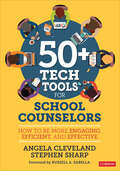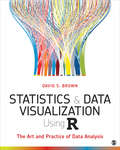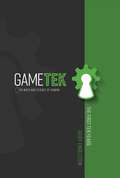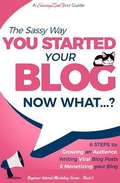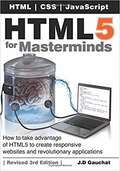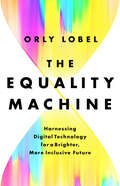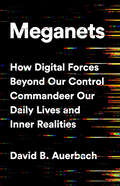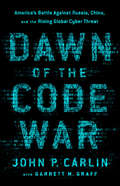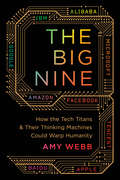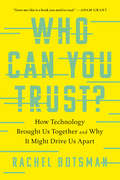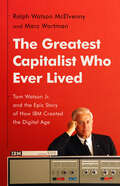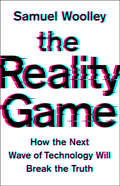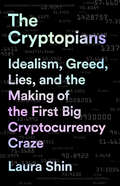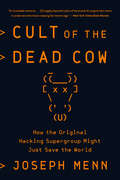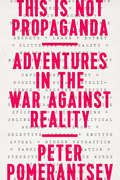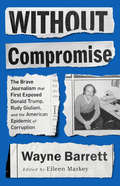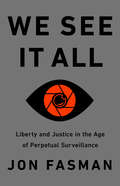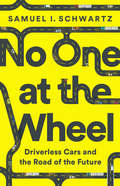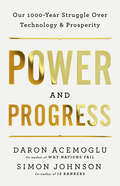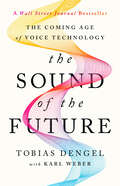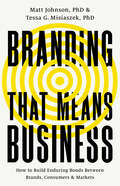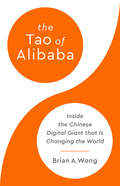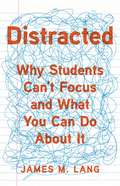- Table View
- List View
50+ Tech Tools for School Counselors: How to Be More Engaging, Efficient, and Effective
by Angela Cleveland Stephen SharpDigital tools that will transform your practice Educating students in the 21st century is about more than preparing them for work in the digital age; it′s also about connecting with the whole student and transcending barriers. Written for school counselors and other education professionals, 50+ Tech Tools for School Counselors provides insightful descriptions of digital tools that can be used daily to not only enrich intervention and instruction but also guide decision-making, streamline work, enhance communication, and promote happier students. Readers will find: a framework for leadership and advocacy through the lens of technology vignettes demonstrating implementation and quotes from students and other stakeholders step-by-step guides and checklists perspectives from counselors around the country that provide a peer-to-peer feel narratives, technical descriptions, and diagrams School counselors are often unsure or unaware of the myriad of existing tech tools. This book will help them enhance their practice, feel more confident, spend less time on paperwork, and enable today’s students to achieve success in school and access information on college and careers.
50+ Tech Tools for School Counselors: How to Be More Engaging, Efficient, and Effective
by Angela Cleveland Stephen SharpDigital tools that will transform your practice Educating students in the 21st century is about more than preparing them for work in the digital age; it′s also about connecting with the whole student and transcending barriers. Written for school counselors and other education professionals, 50+ Tech Tools for School Counselors provides insightful descriptions of digital tools that can be used daily to not only enrich intervention and instruction but also guide decision-making, streamline work, enhance communication, and promote happier students. Readers will find: a framework for leadership and advocacy through the lens of technology vignettes demonstrating implementation and quotes from students and other stakeholders step-by-step guides and checklists perspectives from counselors around the country that provide a peer-to-peer feel narratives, technical descriptions, and diagrams School counselors are often unsure or unaware of the myriad of existing tech tools. This book will help them enhance their practice, feel more confident, spend less time on paperwork, and enable today’s students to achieve success in school and access information on college and careers.
Statistics and Data Visualization Using R: The Art and Practice of Data Analysis
by David S. BrownDesigned to introduce students to quantitative methods in a way that can be applied to all kinds of data in all kinds of situations, Statistics and Data Visualization Using R: The Art and Practice of Data Analysis by David S. Brown teaches students statistics through charts, graphs, and displays of data that help students develop intuition around statistics as well as data visualization skills. By focusing on the visual nature of statistics instead of mathematical proofs and derivations, students can see the relationships between variables that are the foundation of quantitative analysis. Using the latest tools in R and R RStudio® for calculations and data visualization, students learn valuable skills they can take with them into a variety of future careers in the public sector, the private sector, or academia. Starting at the most basic introduction to data and going through most crucial statistical methods, this introductory textbook quickly gets students new to statistics up to speed running analyses and interpreting data from social science research.
Statistics and Data Visualization Using R: The Art and Practice of Data Analysis
by David S. BrownDesigned to introduce students to quantitative methods in a way that can be applied to all kinds of data in all kinds of situations, Statistics and Data Visualization Using R: The Art and Practice of Data Analysis by David S. Brown teaches students statistics through charts, graphs, and displays of data that help students develop intuition around statistics as well as data visualization skills. By focusing on the visual nature of statistics instead of mathematical proofs and derivations, students can see the relationships between variables that are the foundation of quantitative analysis. Using the latest tools in R and R RStudio® for calculations and data visualization, students learn valuable skills they can take with them into a variety of future careers in the public sector, the private sector, or academia. Starting at the most basic introduction to data and going through most crucial statistical methods, this introductory textbook quickly gets students new to statistics up to speed running analyses and interpreting data from social science research.
Gametek: The Math and Science of Gaming
by Geoff Engelstein2017 marks the ten-year anniversary of the GameTek segment on the Dice Tower podcast. Connecting games to math, science, and psychology, GameTek has grown to be one of the most popular parts of the show. This volume commemorates the anniversary with a collection of over seventy of the best segments, many with annotations and illustrations. <p><p> With chapters on everything from Rock, Paper, Scissors to the Prisoner's Dilemma to Player Engagement to Quasicrystals to Buddha's Forbidden Games, GameTek is sure to delight not just game designers and players, but anyone who wants to learn about the world from a new perspective.
You Started Your Blog: Now What...?
by Gundi Gabrielle<p>PLEASE NOTE: This book is written for COMPLETE BEGINNERS. <p>Those that have just set up their first blog and are now struggling with the next steps and where to go from here. It was written in response to feedback I received from my first book, which teaches the technical set up to complete beginners. I noticed patterns of what people were struggling with - often just even deciding what topic to focus on - and how blogging works in general. <p>This book will take you by the hand and guide you through the next steps - the solid, basic techniques that every successful blogger started with. There is no magic pill to suddenly attract thousands of followers - although there are a few techniques that can speed things up and we will cover them. Another area that is often underestimated is learning the WRITING STYLE OF BLOGGING, including how to format your posts.T his book goes into detail and provides resources for further training as that is obviously not something you will learn overnight. <p>We will also look at the characteristics of Viral blog posts, but - once again - don't expect a magic pill! Blogging is hard work and becoming a good blogger - a good blog writer - takes training and time, even if you are already experienced in writing. People read blogs differently than books and unless you adjust to that, you will have a hard time attracting an audience - no matter how experienced a writer you are. Finally, we wil go over the basic monetization strategies that are available to bloggers. <p>If you are new to blogging and are willing to put in the necessary work - and do so consistently - this book will give you a good basic start and take out much of the confusion new bloggers face. Of course, blogging also involves the powerful marketing techniques of SEO and Social Media and they are discussed in depth in part 3 and 4 of this series. I have personally found Kindle Publishing to be another great way to grow a blog following quickly - faster than any other technique actually - and so it is included as part 5 of this series. <p>Once again - if you are looking for advanced techniques, this book will not be for you - it is specifically aimed at beginners who have just started their first blog.</p>
HTML5 for Masterminds: How to take advantage HTML5 to create responsive websites and revolutionary applications
by J. D GauchatHTML5 for Masterminds leads the reader step-by-step to master the complex subjects required to create websites and web applications. After reading this book, you will know how to structure your documents with HTML, how to style them with CSS, and how to work with the most powerful JavaScript APIs. <p><p>This book is not an introduction, but instead a complete course that teaches you how to build responsive websites and amazing web applications from scratch. Every chapter explores both basic and sophisticated concepts of HTML, CSS, and JavaScript. Functional examples support the information introduced in every chapter to guide beginners and experts throughout every single element, style, and function included in these languages. <p> The goal of HTML5 for Masterminds is to make you familiar with the most advanced technologies for the web. It was designed to prepare you for the future, and it was written for the genius inside you, for Masterminds.
The Equality Machine: Harnessing Digital Technology for a Brighter, More Inclusive Future
by Orly LobelAN ECONOMIST BEST BOOK OF 2022 At a time when AI and digital platforms are under fire, Orly Lobel, a renowned tech policy scholar, defends technology as a powerful tool we can harness to achieve equality and a better future. Much has been written about the challenges tech presents to equality and democracy. But we can either criticize big data and automation or steer it to do better. Lobel makes a compelling argument that while we cannot stop technological development, we can direct its course according to our most fundamental values. With provocative insights in every chapter, Lobel masterfully shows that digital technology frequently has a comparative advantage over humans in detecting discrimination, correcting historical exclusions, subverting long-standing stereotypes, and addressing the world&’s thorniest problems: climate, poverty, injustice, literacy, accessibility, speech, health, and safety. Lobel's vivid examples—from labor markets to dating markets—provide powerful evidence for how we can harness technology for good. The book&’s incisive analysis and elegant storytelling will change the debate about technology and restore human agency over our values.
Meganets: How Digital Forces Beyond Our Control Commandeer Our Daily Lives and Inner Realities
by David B. AuerbachHow the autonomous digital forces jolting our lives – as uncontrollable as the weather and plate tectonics – are transforming life, society, culture, and politics.David Auerbach&’s exploration of the phenomenon he has identified as the meganet begins with a simple, startling revelation: There is no hand on the tiller of some of the largest global digital forces that influence our daily lives: from corporate sites such as Facebook, Amazon, Google, YouTube, Instagram, and Reddit to the burgeoning metaverse encompassing cryptocurrencies and online gaming to government systems such as China&’s Social Credit System and India&’s Aadhaar.As we increasingly integrate our society, culture and politics within a hyper-networked fabric, Auerbach explains how the interactions of billions of people with unfathomably large online networks have produced a new sort of beast: ever-changing systems that operate beyond the control of the individuals, companies, and governments that created them.Meganets, Auerbach explains, have a life of their own, actively resisting attempts to control them as they accumulate data and produce spontaneous, unexpected social groups and uprisings that could not have even existed twenty years ago. And they constantly modify themselves in response to user behavior, resulting in collectively authored algorithms none of us intend or control. These enormous invisible organisms exerting great force on our lives are the new minds of the world, increasingly commandeering our daily lives and inner realities.Auerbach&’s analysis of these gargantuan opaque digital forces yield important insights such as:The conventional wisdom that the Googles and Facebook of this world are tightly run algorithmic entities is a myth. No one is really in control.The efforts at reform - to get lies and misinformation off meganets - run into a brick wall because the companies and executives who run them are trapped by the persistent, evolving, and opaque systems they have created.Bitcoin and other cryptocurrencies are uncontrollable and their embrace by elite financial institutions threatens the entire economyWe are asking the wrong questions in assuming that if only the Facebooks of this world could be better regulated or broken up that they would be better, more ethical citizens.Why questions such as making algorithms fair and bias-free and whether AI can be a tool for good or evil are wrong and misinformedAuerbach then comes full circle, showing that while we cannot ultimately control meganets we can tame them through the counterintuitive measures he describes in detail.
Dawn of the Code War: America's Battle Against Russia, China, and the Rising Global Cyber Threat
by Garrett M. Graff John P. CarlinThe inside story of how America's enemies launched a cyber war against us-and how we've learned to fight back With each passing year, the internet-linked attacks on America's interests have grown in both frequency and severity. Overmatched by our military, countries like North Korea, China, Iran, and Russia have found us vulnerable in cyberspace. The "Code War" is upon us. In this dramatic book, former Assistant Attorney General John P. Carlin takes readers to the front lines of a global but little-understood fight as the Justice Department and the FBI chases down hackers, online terrorist recruiters, and spies. Today, as our entire economy goes digital, from banking to manufacturing to transportation, the potential targets for our enemies multiply. This firsthand account is both a remarkable untold story and a warning of dangers yet to come.
The Big Nine: How the Tech Titans and Their Thinking Machines Could Warp Humanity
by Amy WebbA call-to-arms about the broken nature of artificial intelligence, and the powerful corporations that are turning the human-machine relationship on its head.We like to think that we are in control of the future of "artificial" intelligence. The reality, though, is that we--the everyday people whose data powers AI--aren't actually in control of anything. When, for example, we speak with Alexa, we contribute that data to a system we can't see and have no input into--one largely free from regulation or oversight. The big nine corporations--Amazon, Google, Facebook, Tencent, Baidu, Alibaba, Microsoft, IBM and Apple--are the new gods of AI and are short-changing our futures to reap immediate financial gain. In this book, Amy Webb reveals the pervasive, invisible ways in which the foundations of AI--the people working on the system, their motivations, the technology itself--is broken. Within our lifetimes, AI will, by design, begin to behave unpredictably, thinking and acting in ways which defy human logic. The big nine corporations may be inadvertently building and enabling vast arrays of intelligent systems that don't share our motivations, desires, or hopes for the future of humanity.Much more than a passionate, human-centered call-to-arms, this book delivers a strategy for changing course, and provides a path for liberating us from algorithmic decision-makers and powerful corporations.
Who Can You Trust?: How Technology Brought Us Together and Why It Might Drive Us Apart
by Rachel BotsmanIf you can't trust those in charge, who can you trust?From government to business, banks to media, trust in institutions is at an all-time low. But this isn't the age of distrust--far from it.In this revolutionary book, world-renowned trust expert Rachel Botsman reveals that we are at the tipping point of one of the biggest social transformations in human history--with fundamental consequences for everyone. A new world order is emerging: we might have lost faith in institutions and leaders, but millions of people rent their homes to total strangers, exchange digital currencies, or find themselves trusting a bot. This is the age of "distributed trust," a paradigm shift driven by innovative technologies that are rewriting the rules of an all-too-human relationship.If we are to benefit from this radical shift, we must understand the mechanics of how trust is built, managed, lost, and repaired in the digital age. In the first book to explain this new world, Botsman provides a detailed map of this uncharted landscape--and explores what's next for humanity.
The Greatest Capitalist Who Ever Lived: Tom Watson Jr. and the Epic Story of How IBM Created the Digital Age
by Ralph Watson McElvenny Marc WortmanThe enduring story of Thomas Watson Jr.—a figure more important to the creation of the modern world than Rockefeller, Vanderbilt, and Morgan Nearly fifty years into IBM&’s existence, Thomas Watson Jr. undertook the biggest gamble in business history when he &“bet the farm&” on the creation of the IBM System/360, the world&’s first fully integrated and compatible mainframe computer. As CEO, Watson drove a revolution no other company—then or now—would dare, laying the foundation for the digital age that has transformed every society, corporation, and government. The story of Watson being &“present at the creation&” of the digital age is intertwined with near-Shakespearean personal drama. While he put IBM and its employees at risk, Watson also carried out a family-shattering battle over the future of the company with his brother Dick. This titanic struggle between brothers led to Dick&’s death and almost killed Watson Jr. himself. Though he was eventually touted by Fortune magazine as &“the greatest capitalist who ever lived,&” Watson&’s directionless, playboy early years made him an unlikely candidate for corporate titan. How he pulled his life together and, despite personal demons, paved the way for what became a global industry is an epic tale full of drama, inspiration, and valuable lessons in leadership, risk-taking, and social responsibility.
The Reality Game: How the Next Wave of Technology Will Break the Truth
by Samuel WoolleyFake news posts and Twitter trolls were just the beginning. What will happen when misinformation moves from our social media feeds into our everyday lives?Online disinformation stormed our political process in 2016 and has only worsened since. Yet as Samuel Woolley shows in this urgent book, it may pale in comparison to what's to come: humanlike automated voice systems, machine learning, "deepfake" AI-edited videos and images, interactive memes, virtual reality, and more. These technologies have the power not just to manipulate our politics, but to make us doubt our eyes and ears and even feelings.Deeply researched and compellingly written, The Reality Game describes the profound impact these technologies will have on our lives. Each new invention built without regard for its consequences edges us further into this digital dystopia.Yet Woolley does not despair. Instead, he argues pointedly for a new culture of innovation, one built around accountability and especially transparency. With social media dragging us into a never-ending culture war, we must learn to stop fighting and instead prevent future manipulation. This book shows how we can use our new tools not to control people but to empower them.
The Cryptopians: Idealism, Greed, Lies, and the Making of the First Big Cryptocurrency Craze
by Laura ShinThe story of the idealists, technologists, and opportunists fighting to bring cryptocurrency to the masses.In their short history, Bitcoin and other cryptocurrencies have gone through booms, busts, and internecine wars, recently reaching a market valuation of more than $2 trillion. The central promise of crypto endures—vast fortunes made from decentralized networks not controlled by any single entity and not yet regulated by many governments.The recent growth of crypto would have been all but impossible if not for a brilliant young man named Vitalik Buterin and his creation: Ethereum. In this book, Laura Shin takes readers inside the founding of this novel cryptocurrency network, which enabled users to launch their own new coins, thus creating a new crypto fever. She introduces readers to larger-than-life characters like Buterin, the Web3 wunderkind; his short-lived CEO, Charles Hoskinson; and Joe Lubin, a former Goldman Sachs VP who became one of crypto&’s most well-known billionaires. Sparks fly as these outsized personalities fight for their piece of a seemingly limitless new business opportunity.This fascinating book shows the crypto market for what it really is: a deeply personal struggle to influence the coming revolution in money, culture, and power.
Cult of the Dead Cow: How the Original Hacking Supergroup Might Just Save the World
by Joseph MennThe shocking untold story of the elite secret society of hackers fighting to protect our privacy, our freedom -- even democracy itselfCult of the Dead Cow is the tale of the oldest, most respected, and most famous American hacking group of all time. Though until now it has remained mostly anonymous, its members invented the concept of hacktivism, released the top tool for testing password security, and created what was for years the best technique for controlling computers from afar, forcing giant companies to work harder to protect customers. They contributed to the development of Tor, the most important privacy tool on the net, and helped build cyberweapons that advanced US security without injuring anyone. With its origins in the earliest days of the Internet, the cDc is full of oddball characters -- activists, artists, even future politicians. Many of these hackers have become top executives and advisors walking the corridors of power in Washington and Silicon Valley. The most famous is former Texas Congressman and current presidential candidate Beto O'Rourke, whose time in the cDc set him up to found a tech business, launch an alternative publication in El Paso, and make long-shot bets on unconventional campaigns.Today, the group and its followers are battling electoral misinformation, making personal data safer, and battling to keep technology a force for good instead of for surveillance and oppression. Cult of the Dead Cow shows how governments, corporations, and criminals came to hold immense power over individuals and how we can fight back against them.
This Is Not Propaganda: Adventures in the War Against Reality
by Peter PomerantsevWhen information is a weapon, every opinion is an act of war.We live in a world of influence operations run amok, where dark ads, psyops, hacks, bots, soft facts, ISIS, Putin, trolls, and Trump seek to shape our very reality. In this surreal atmosphere created to disorient us and undermine our sense of truth, we've lost not only our grip on peace and democracy--but our very notion of what those words even mean.Peter Pomerantsev takes us to the front lines of the disinformation age, where he meets Twitter revolutionaries and pop-up populists, "behavioral change" salesmen, Jihadi fanboys, Identitarians, truth cops, and many others. Forty years after his dissident parents were pursued by the KGB, Pomerantsev finds the Kremlin re-emerging as a great propaganda power. His research takes him back to Russia--but the answers he finds there are not what he expected.
Without Compromise: The Brave Journalism that First Exposed Donald Trump, Rudy Giuliani, and the American Epidemic of Corruption
by Wayne BarrettA collection of groundbreaking investigations by Wayne Barrett, the intrepid, muckraking Village Voice journalist who exposed corruption in New York City and beyond.With piercing moral clarity and exacting rigor, Wayne Barrett tracked political corruption in the pages of the Village Voice fact by fact, document by document for 40 years. The first to report on the scams and crooked deals that fueled the rise of Donald Trump in 1979, Barrett went on to expose the shady dealings of small-time slum lords and powerful New York City politicians alike, from Ed Koch to Rudy Giuliani to Michael Bloomberg.Without Compromise is the first anthology of Barrett's investigative work, accompanied by essays from colleagues and those he trained. In an age of lies, fog, and propaganda, when the profession of journalism is degraded by the White House and the industry is under financial threat, Barrett reminds us that facts, when clearly accumulated, are our best defense of democracy.Featuring essays by:Joe ConasonKim Phillips-FeinErrol LouisGerson BorreroTom RobbinsTracie McMillanPeter NoelAdam FifieldJarrett MurphyAndrea BernsteinJennifer GonnermanMac Barrett
We See It All: Liberty and Justice in an Age of Perpetual Surveillance
by Jon FasmanAn investigation into the legal, political, and moral issues surrounding how the police and justice system use surveillance technology, asking the question: what are citizens of a free country willing to tolerate in the name of public safety?As we rethink the scope of police power, Jon Fasman&’s chilling examination of how the police and the justice system use the unparalleled power of surveillance technology—how it affects privacy, liberty, and civil rights—becomes more urgent by the day. Embedding himself within police departments on both coasts, Fasman explores the moral, legal, and political questions posed by these techniques and tools.By zeroing in on how facial recognition, automatic license-plate readers, drones, predictive algorithms, and encryption affect us personally, Fasman vividly illustrates what is at stake and explains how to think through issues of privacy rights, civil liberties, and public safety. How do these technologies impact how police operate in our society? How should archaic privacy laws written for an obsolete era—that of the landline and postbox—be updated?Fasman looks closely at what can happen when surveillance technologies are combined and put in the hands of governments with scant regard for citizens&’ civil liberties, pushing us to ask: Is our democratic culture strong enough to stop us from turning into China, with its architecture of control?
No One at the Wheel: Driverless Cars and the Road of the Future
by Karen Kelly Samuel I. SchwartzThe country's leading transport expert describes how the driverless vehicle revolution will transform highways, cities, workplaces and laws not just here, but across the globe. Our time at the wheel is done. Driving will become illegal, as human drivers will be demonstrably more dangerous than cars that pilot themselves. Is this an impossible future, or a revolution just around the corner?Sam Schwartz, America's most celebrated transportation guru, describes in this book the revolution in self-driving cars. The ramifications will be dramatic, and the transition will be far from seamless. It will overturn the job market for the one in seven Americans who work in the trucking industry. It will cause us to grapple with new ethical dilemmas-if a car will hit a person or a building, endangering the lives of its passengers, who will decide what it does? It will further erode our privacy, since the vehicle can relay our location at any moment. And, like every other computer-controlled device, it can be vulnerable to hacking.Right now, every major car maker here and abroad is working on bringing autonomous vehicles to consumers. The fleets are getting ready to roll and nothing will ever be the same, and this book shows us what the future has in store.
Power and Progress: Our Thousand-Year Struggle Over Technology and Prosperity
by Daron Acemoglu Simon JohnsonThe bestselling co-author of Why Nations Fail and the bestselling co-author of 13 Bankers deliver a bold reinterpretation of economics and history that will fundamentally change how you see the world A thousand years of history and contemporary evidence make one thing clear: progress depends on the choices we make about technology. New ways of organizing production and communication can either serve the narrow interests of an elite or become the foundation for widespread prosperity. The wealth generated by technological improvements in agriculture during the European Middle Ages was captured by the nobility and used to build grand cathedrals, while peasants remained on the edge of starvation. The first hundred years of industrialization in England delivered stagnant incomes for working people. And throughout the world today, digital technologies and artificial intelligence undermine jobs and democracy through excessive automation, massive data collection, and intrusive surveillance. It doesn&’t have to be this way. Power and Progress demonstrates the path of technology was once—and may again—be brought under control. Cutting-edge technological advances can become empowering and democratizing tools, but not if all major decisions remain in the hands of a few hubristic tech leaders. With their bold reinterpretation of economics and history, Daron Acemoglu and Simon Johnson fundamentally change how we see the world, providing the vision needed to redirect innovation so it again benefits most people.
The Sound of the Future: The Coming Age of Voice Technology
by Tobias DengelA Wall Street Journal Bestseller A USA Today Bestseller Why voice technology is the next big thing in technology, as big as mobile a decade ago and the internet in the late 90s, fundamentally altering the way companies do business. Voice is the next technology – remarkably similar in potential impact to the internet and mobile computing - poised to change the way the world works. Tobias Dengel is in the vanguard of this breakthrough, understanding the deep, wide-ranging implications voice will have for every industry. In The Sound of the Future, he connects the dots about this emerging paradigm to vividly illustrate how business leaders can stay ahead of the game, rather than scrambling to catch up, as voice technology gradually reveals its power, creating a host of new winners and losers. Using fascinating, colorful stories, Dengel explains how the &“voice-first&” experience is becoming part of the global technology mainstream, exploring the ways voice will do a better job of serving basic human needs such as safety, speed, accuracy, convenience, and fun, as well as making it possible for hundreds of millions of people around the planet to participate more fully and productively in today&’s high-tech world by making interactions with technology virtually effortless. A pervasive technology like the internet and mobile, voice, with applications in marketing, sales, service, manufacturing, and logistics, will change the way we work at every level and every function, driving down costs, boosting productivity, and enabling the creation of entirely new business models. This is not simply about Siri and Alexa. They are the tantalizing but incomplete precursors of the ultimate interface that will make technology easier, faster, more accurate, and more human.
Branding that Means Business: How to Build Enduring Bonds between Brands, Consumers and Markets
by Matt Johnson Tessa G MisiaszekA revelatory guide on how to build, sustain and grow a brand. A brand is either beloved, or it&’s noise. We live in a fast-paced world of immediate gratification where consumers can listen to any song, watch any movie, or read any article, with the touch of a few buttons. They are peppered with hyper-personalized targeting for products that can be ordered seamlessly and arrive within hours. And if your brand isn&’t the first to come to mind, they&’ll click that button and it&’ll be delivered by someone else. So how do you make sure your brand connects with consumers? Branding that Means Business draws from the authors&’ experience and business literature as well as psychology, sociology, and even anthropology to show readers that while any brand serves the business, the mechanisms that enable it are all about connecting with people. Readers will learn how to create, maintain, and operationalize their brand, and think creatively about how to differentiate their product and most importantly, make consumers fall in love with it.
The Tao of Alibaba: Inside the Chinese Digital Giant That Is Changing the World
by Brian A WongFrom a long-time Alibaba executive and former special assistant to Jack Ma, this is the first book to articulate how Alibaba's unique culture and &“tai chi&” management principles are providing a business and economic development model for the rest of the world. If you took the economic might of Amazon, and added the penetration of Facebook, the ubiquity of Google, and the cultural significance of YouTube, you might have something starting to resemble Alibaba. Commonly mischaracterized as a kind of Chinese eBay for businesses, Alibaba and its interlinked network of products and services have exploded into global markets, disrupting conventional businesses and creating previously unimaginable opportunities for millions of small businesses worldwide. This book reveals the Tao of Alibaba—the company&’s &“secret sauce&”—a consciously cultivated ethos and spirit that has enabled Alibaba to weather tough times and setbacks, and persist toward a common mission. It is a blueprint of the company&’s management philosophy, crystalized into the most important elements that have driven its success, and it provides a road map for how to incorporate these principles into any organization&’s operations. Wong distills his nearly two decades of experience inside the company to show readers how to align their organization&’s capabilities with performance-maximizing tools in order to achieve success. But most importantly, the Tao of Alibaba teaches the pursuit of greater purpose and meaning, steering entrepreneurs to view their ventures as a vehicle for having profound and lasting impacts on their communities. Ultimately, the lessons shared in The Tao of Alibaba will serve as timeless tools for any entrepreneur seeking to configure their organization toward purpose and impact.
Distracted: Why Students Can't Focus and What You Can Do About It
by James M. LangKeeping students focused can be difficult in a world filled with distractions -- which is why a renowned educator created a scientific solution to one of every teacher's biggest problems.Why is it so hard to get students to pay attention? Conventional wisdom blames iPhones, insisting that access to technology has ruined students' ability to focus. The logical response is to ban electronics in class. But acclaimed educator James M. Lang argues that this solution obscures a deeper problem: how we teach is often at odds with how students learn. Classrooms are designed to force students into long periods of intense focus, but emerging science reveals that the brain is wired for distraction. We learn best when able to actively seek and synthesize new information. In Distracted, Lang rethinks the practice of teaching, revealing how educators can structure their classrooms less as distraction-free zones and more as environments where they can actively cultivate their students' attention. Brimming with ideas and grounded in new research, Distracted offers an innovative plan for the most important lesson of all: how to learn.
